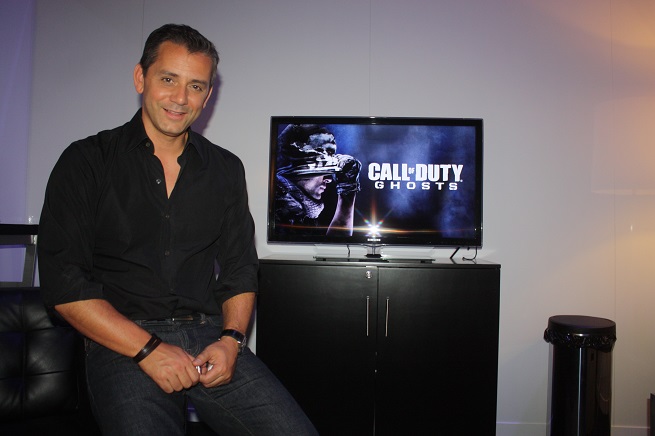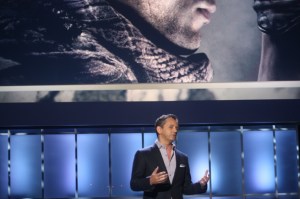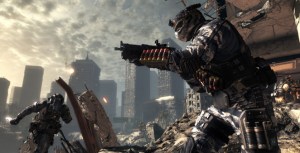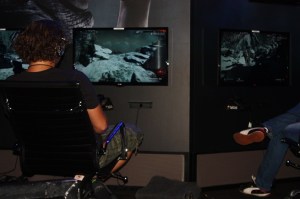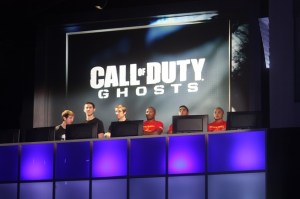Activision keeps doubling down on Call of Duty, and so far, it has been paying off in rising sales every year for the fastest-selling video game franchise. Ten million people are playing Call of Duty every day. This year, the company fully expects them to begin playing Call of Duty: Ghosts starting Nov. 5.
Eric Hirshberg, president and chief executive of Activision Publishing, a division of Activision Blizzard, brushes off questions about whether gravity will eventually pull down sales. This year, there’s more competition than ever: Battlefield 4 will be arriving from rival Electronic Arts. New game consoles that will also suck the money out of consumer wallets are also coming this fall.
So what is Hirshberg going to do? He’s doubling down, of course, starting with this week’s splashy multiplayer revelation event (see our Ghosts preview here) in downtown Los Angeles, where we caught up with him. Here is an edited transcript of our interview.
GamesBeat: What feedback are you getting about your multiplayer event?
Hirshberg: The response seems good. I’ve been checking our social media channels and talking to a few journalists. People are very positive. That’s one thing that’s great about social media. It’s not scientific, but you get a feeling for how things are being received. People were impressed with the way the game looked. That’s the most noticeable difference with the new engine and the next-gen hardware. It’s the most beautiful multiplayer game we’ve ever made.
I see two things getting the most traction. One, the dynamic maps — people are interested in trying that and seeing how it changes the game. They’re not just novelty events within the maps, something cosmetic. They change the flow of the map. They change the access points. A lot of them are under the player’s control.
GamesBeat: I got crushed by a falling roof in my session.
Hirshberg: It’s funny. For the live match we did with the pro players and the Marines, we chose that level – which is a beautiful level, the stadium – because one of the kill streaks is the Odin Strike, a missile from a space station that comes down and destroys the map in the middle of the game. It completely changes the landscape around you.
In every single rehearsal, someone got that perk. And of course, when we did it live no one got it. But people will see it eventually. It’s in the trailer.
The other thing people seem very curious about is the approach to second screen and the Clan Wars game. I can tell you, it’s really fun. It takes the console game and creates a whole new way to compete that’s very appropriate to a mobile device. It’s a way to stay engaged with the franchise and your friends when you’re not in front of the console.
GamesBeat: It seems like you have a better handle on mobile and integrating it into the experience.
Hirshberg: When the current generation of consoles came out, things like YouTube and Twitter and Facebook and smartphones and tablets didn’t exist. Those devices weren’t designed to interact with other devices and social platforms. Now the first parties have seen the same trends that we have, so things that we were trying to do a couple of years ago with Call of Duty Elite — which required a lot of technological gymnastics to pull off, even something as simple as pushing a character loadout from the smartphone to the console — now there are a lot more capabilities. It’s opened up the walled garden. We can take all the stats and progression into a game like Clan Wars and not only create a cool way to track your progress, but also a new way to compete.
GamesBeat: Is there any tension there, where you want to get out of the walled garden and the platforms would be happy to keep you inside it?
Hirshberg: Both Sony and Microsoft acknowledge that entertainment today needs to be connected. We’re all device omnivores today. We all access information and the entertainment we love in a variety of ways. All I can say from my vantage point is that given the way they designed the hardware, they clearly had that connectivity in mind.
GamesBeat: This event seems like a bigger unveiling than last year’s, for multiplayer.
Hirshberg: Maybe? We’ve done even bigger. We did Call of Duty XP a couple of years ago. We have a different approach every year. It’s designed around the specifics of each game.
GamesBeat: I know you mentioned in some of the analyst calls that you guys will spend more in the second half on sales and marketing, just because of all the noise and competition.
Hirshberg: It’s not only direct competition from other games. There’s also going to be a lot of marketing noise for the consoles themselves. Occupying the top spot, we have to make sure we defend our share of voice and get the message out. We’ve got an incredibly innovative and fun new Call of Duty game. It’s going to be great to play on every single platform, current generation or next generation.
GamesBeat: If you look back at last year, what worked really well for getting that message out?
Hirshberg: First of all, a great game by Treyarch. It starts and ends with game quality. The franchise took a lot of new risks, taking it into the future for the first time. A lot of new weapon mechanics, an engaging plot, a very cool multiplayer game that introduced leagues and eSports. The game itself captured people’s imaginations, and from the very beginning we had a smart marketing campaign.
One thing we’ve gotten very good at is speaking directly to our core audience. The first unveiling of Black Ops II was on an FPSRussia video on YouTube. He’s an internet star, someone who’s big within our core audience. It was a clever way to announce something, very non-traditional. It starts there and escalates through the Guy Ritchie launch commercial, which got something like 35 million views on YouTube. What we do is we try to speak to the core – let them know that we’re making a great game for them – and then we try to present this as a pop culture event.
There are people who are curious about games, or who are more casual consumers of games. We want to invite them into the franchise as well. My analogy is, a lot of people who aren’t hardcore science fiction fans went and saw the movie Avatar. We have a core audience that loves our game and that we’re focused on, but Call of Duty is one of those events each year that people want to be a part of.
GamesBeat: The part about being able to upgrade from Xbox 360 to Xbox One, is that a difficult technology for the game-makers to come up with, or is it something that you expect almost everybody to do?
Hirshberg: It also works on the PS3 to the PS4. We partnered with the first parties on this topic very early, because we have a big community and we want to keep it together. We want to make it as easy as possible for them to migrate to the next generation. That benefits not only our games, but also the first party and their marketing efforts. People have invested a lot of time and accomplishment into these games. If they can take those things with them, like their Season Pass content, it’s going to make the proposition that much more appealing.
GamesBeat: What were the discussions like as far as including women soldiers?
Hirshberg: That’s something we’ve wanted to do for a long time. We’ve had a lot of requests from the community. A lot of women play the game. The reason it was right to do this year—As you know, in past Call of Duty multiplayer games, you didn’t even have control over which avatar you had in the game, let alone all the customization. That wasn’t an area with a lot of control baked in.
This year, with all the focus on character customization, we’re giving people the ability to decide not only how their soldier is outfitted and equipped, but how they look, with all kinds of different visual options. We thought that this was the right year to introduce female characters. It provided a nice closing shot for the trailer, too.
GamesBeat: Analysts are saying that this game defies gravity. It seems like eventually they’re going to have to be right.
Hirshberg: [laughs] Well, knock on wood.
GamesBeat: What are you doing to hold that off for another year?
Hirshberg: At a certain point, the narrative behind that question should change. I don’t know where the threshold is after which people stop talking about “defying gravity,” as if there’s some kind of downward force on it, and acknowledge that it’s a franchise that continues to gain momentum. I know that’s counterintuitive in a lot of ways. It defies conventional wisdom. But I think that Call of Duty has more in common with the way that we consume our favorite sports leagues and teams than, say, a blockbuster movie.
This is something people engage with year-round. They engage with it in multiple ways. We have blockbuster launches, but then there’s a long, solid tail of content that keeps people engaged for a long time. People develop rivalry and camaraderie and social networks, both virtual and actual, around playing this game. If we keep providing superb content and innovation each year, people seem to have a continued appetite for it.
GamesBeat: The rise of eSports seems to have helped as well.
Hirshberg: It’s something we’re obviously very interested in. People play Call of Duty competitively. They did it long before we started putting features in the game to make it more seamless. The Call of Duty world championships we staged this year was incredibly well-viewed. It was a great event for us. It drove tremendous engagement. We want to make sure that we’re baking it into the game, and we want to make sure people from a lot of different levels can participate.
GamesBeat: I’m curious about some of the third-party analysis of preorders. Cowen & Co.’s analysts came up with their index for pre-orders. The good thing was that they showed that Ghosts is number one, but they also believe that it’s down significantly from Black Ops II.
Hirshberg: We’ve talked about this from the very first earnings calls addressing this year. If history is any guide, console transition years bring a lot of excitement. They also bring a lot of obstacles within the year. People are unsure which platform they’re going to get or whether they’ll upgrade or when they’re going to upgrade. It’s not the same as selling into a stable ecosystem where everyone knows what machine they have and what machine their friends play on. There’s a lot more uncertainty. We anticipated that having an impact, and we’re seeing that to an extent, but I was glad to see the Cowen analysis as well, showing that Ghosts is still on top in terms of demand. That matches our internal analysis. We think the console transition will provide some huge opportunities in the long term and some challenges in the short term, like they always have.
 GamesBeat: The game changes a few things pretty drastically this year in the single-player campaign, like with the emphasis on stealth. How have those things gone over? Have you been able to measure that?
GamesBeat: The game changes a few things pretty drastically this year in the single-player campaign, like with the emphasis on stealth. How have those things gone over? Have you been able to measure that?
Hirshberg: Well, you haven’t played the whole game yet. [laughs] You might be responding to some of the levels we chose to show at our reveal surrounding E3. I get where you’re coming from, if all you’ve seen are the underwater levels and the Cornered level and the No Man’s Land level. Those do have a more tense, quiet, stealth gameplay signature to them. Trust me when I say that this game has the big Call of Duty cinematic, over the top moments as well.
Those levels were chosen for a couple of reasons. They were great demonstrations of the next-gen visuals. The underwater area is on a whole different level of rendering compared to what we’ve done in the past. We kind of get this critique coming and going. If things feel too much like past years, people say it’s just another Call of Duty game. If it veers too much, people say we’re changing too much. I think we’ve struck a nice balance. I’ve played the campaign from start to finish multiple times at different points in the development process, and it’s great. We have a great variety of gameplay. The levels where you get to play with and as Riley the dog are super fun. You’ll see, in more reveals to come, the variety and the events big and small that are baked into the campaign.
I do think that tonality is one of the things we strove for with [Hollywood script writer] Steve Gaghan’s involvement and the idea of playing with a single squad through the entire campaign. We wanted to build more relationships and have a little less anonymity to the characters surrounding you. Those slower-paced moments, more stealthy moments, are great for that.
VentureBeat's mission is to be a digital town square for technical decision-makers to gain knowledge about transformative enterprise technology and transact. Learn More
